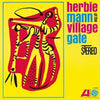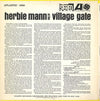



Herbie Mann at The Village Gate
Herbie Mann (flutes) [click here to see more vinyl featuring Herbie Mann]
Hagood Hardy (vibraharp), Ahmad Abdul-Malik (bass), Ray Mantilla (conga, percussion), Chief Bey (African drum, percussion), Rudy Collins (drums), Ben Tucker (bass)
Written by Ben Tucker (A1), DuBose Heyward (A2), George Gershwin (A2, B1)
1 LP, standard sleeve
Original analog Master tape : YES
Heavy Press : 180g
Record color : black
Speed : 33 RPM
Size : 12'’
Stereo
Studio
Record Press : Pallas
Label : Speakers Corner
Original Label : Atlantic
Recording: November 1961 live at The Village Gate, New York City by Tom Dowd & Phil Lehle
Production: Nesuhi Ertegun
Originally released in 1966
Reissued in 2018
Tracks :
Side A :
Side B :
1. It Ain't Necessarily So
Reviews :
« At the Village Gate is the album that first brought Herbie Mann to widespread popular attention, thanks to the inclusion of "Comin' Home Baby," which soon became one of the flautist's signature songs. By the time of the record's release in 1962, however, Mann had already been a bandleader for years, honing his pioneering blend of Afro-Cuban and Brazilian music with hard bop's funky structures just under the public radar. As a result, At the Village Gate sounds more like a summation than a beginning. The nearly 40-minute album is a mere three tracks long, with an epic 20-minute version of "It Ain't Necessarily So" taking up the entirety of the second side of the original vinyl. The highlight, however, is a stunning take on the standard "Summertime," one that turns the Gershwin tune into an easy swinging, proto-bossa nova song that features a glorious extended solo by Mann over a conga beat. In its way, it's just as revelatory as Miles Davis' better-known recasting of the tune. » AllMusic Review by Rovi Staff
« Jazz flautist’s electrifying 1961 performance gets a wonderful vinyl upgrade.
Herbie Mann’s musical career lasted for five decades. The New York native was primarily a bop flutist, but also played saxophone and clarinet. In the late 1950’s, Mann toured Africa and recorded two albums of Afro-Cuban jazz, Flautista! and Herbie Mann’s African Suite both in 1959. He was an early collaborator with Antonio Carlos Jobim and Baden Powell, helping to popularize the emerging bossa nova movement. This amalgam of jazz and world music became his calling card. In 1969, Mann migrated to a more contemporary sound on 1969’s Memphis Underground. While his jazz purist credentials were questioned, he was now recording with modern crossover artists, including Duane Allman, Cissy Houston, Larry Coryell, Donald “Duck” Dunn, Chuck Rainey, Al Jackson Jr. and Bernard Purdie. This new approach, infused elements of Southern soul, reggae, rock, blues and soul. Uniting the context for these oddly fitting styles was a dependence on a common denominator…the groove! In a rarity, Herbie Mann had several pop hits and charted 25 albums on the Billboard Top 200. In the 70’s he founded his own label, Embryo and produced albums for Phil Woods and Ron Carter. He later played flutes with The Bee Gees on Spirits Have Flown, and recorded with Sterolab. Mann kept active on the traditional jazz circuit with Chet Baker, Count Basie, Hank Jones, Michel Legrand and Carmen McCrae. He produced nearly 80 albums as a leader.
As with many jazz musicians, live albums seem to offer a better showcase for a band leader. Speakers Corner has released a re-mastered 180-gram vinyl upgrade to the 1961 live album, Herbie Mann – At The Village Gate. With a strong rhythm section (drums, double bass, percussion, drums), Mann incorporates the tempos with his inimitable flute artistry. The performance consists of only three songs, but the dynamics of live performance seems to elevate this flautists and his talented group. Side One opens with a smart little blues groove (“Comin’ Home Baby”) that the drums, percussion and double bass initiate. Mann intones his customary jazzy coolness on the “C” flute. He is joined by Canadian Hagood Hardy on vibraharp. The infectious tempo complements Mann’s first extended solo. His command of the instrument is flawless. Hardy also solos, and the fusion of global rhythms (Abdul-Malik/bass; Chief Bay/percussion; Rudy Collins/drums) is palpable. Composer Ben Tucker solos as he is backed by a second double bass (Abdul-Malik) and drum. On the final verse, Mann is joined by vibraharp with a subtle descant before a slow fade. At 8:37, it is the shortest cut on the album.
Two Gershwin selections from Porgy And Bess round out the set. The eternal jazz and pop standard, “Summertime” is introduced by an atmospheric resonance (vibraharp. double bass and percussion). Mann’s first solo inhabits the evocative melody with nuanced lyricism. There is an overall Latin (almost like a cha-cha) beat, but with a touch of African cadence. On the second verse, Mann is more forceful. His ability to pivot from melodic interpretation to jazz improvisation is impressive. A second solo has a swaying wistfulness with single-note punctuation. Side Two consists of a twenty minute jam of “It Ain’t Necessarily So”. In a musical with many show-stoppers, this one could be Gershwin’s most creative. The ensemble gets this moving with a syncopated repeat framed by percussion, tambourine and vibraharp. The winding melodic progression is timeless and jazzy. It is set off by an African beat with a relentless pulse. Mann’s flute solo is very extended (even by jazz standards). He navigates through the complex harmonics with precision and flourishes. After a round of well-deserved applause, Hardy jumps in with a gliding run. He is followed by Abdul-Malik’s abstract plucking solo against percussion. Mann is comfortable letting the band do their thing. A great drum solo with some added touches of percussion is noteworthy. As Mann returns to the verse, the side-long exploration winds to a close. There is a feel of primitive and sophisticated nuances in the arrangement.
Speakers Corner’s 180-gram upgrade is top-notch. The overall mix is strong, especially on the bottom end with the rhythm section. Stereo separation is very good (considering the “vintage” era of this recording). A listener can hear the glowing echo of the vibraharp and the crispness of Mann’s “C”. Even the drums (including the African drum) are distinct and not lacking in prominence. Martin Norman and Bob Slutzky’s stunning modernistic cover is eye-catching in 12” format. Liner notes from Willis Conover are incisive and amusing. There is also a technical reference to listeners about observing the R.I.A.A. high frequency roll-off characteristic with a 500 cycle crossover. » Robbie Gerson, Audiophile Audition, Mar 8, 2019


